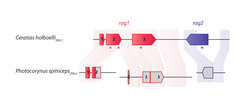Immunogenetics of sexual parasitism in anglerfishes
Lab Boehm

Certain genera of anglerfishes depend on sexual parasitism as their strategy of reproduction. The female attracts males that attach to and eventually fuse with the female, thereby establishing a common blood supply. This represents the only known case of natural parabiosis. Guided by the observation that many species of anglerfishes possess an enlarged olfactory apparatus, we speculated that they might select appropriate males by olfactory evaluation of MHC genotype, a mechanism, which we have discovered some time ago. Therefore, our initial studies aimed at determining MHC diversity in female/male pairs; however, we found that anglerfishes have solved the problem of potential tissue rejection after tissue fusion in a different and quite unexpected way. We established that many genes encoding key elements of adaptive immunity are altered to create either hypomorphic or pseudogenized alleles. The most dramatic changes occur in P. spiniceps and H. mollis, culminating in pseudogenization of RAG1 and RAG2 genes, effectively eliminating somatic diversification of BCRs and TCRs in these fishes. We are now following up these observations in order to establish the characteristics of the innate immune system in this unusual group of vertebrates.
